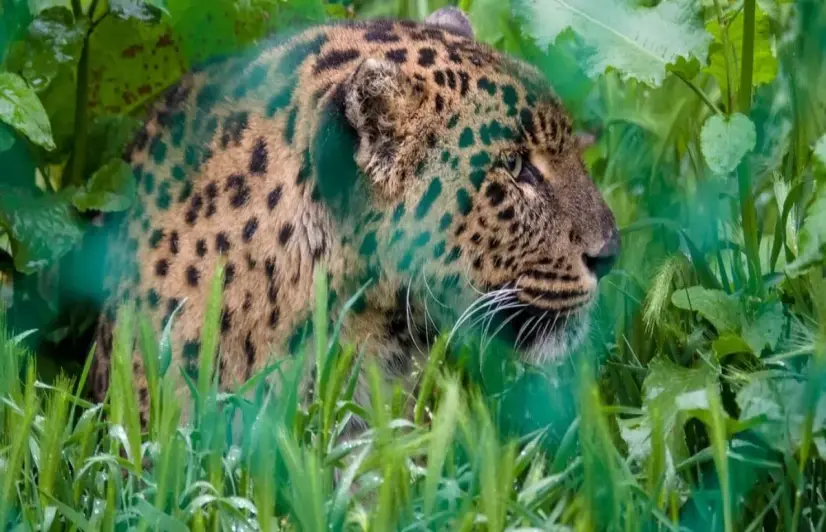In rural Kashmir, leopard attacks are on the rise and farmers fear venturing into apple orchards

In rural Kashmir, leopard attacks are on the rise and farmers fear venturing into apple orchards
Rampant destruction of forest land and encroachment is intensifying man-animal conflict in Kashmir, with leopards increasingly being spotted near or inside human habitats.
Srinagar: On June 3, four-year-old Adha Shakil was reported missing in Budgam district. She was last seen playing on the lawn of her home, less than 10 kilometres from Srinagar International Airport and City Center Lal-Chowk. Early next day, her mutilated body was found in a nearby tree nursery. She had been mauled to death by a leopard.
After a public outcry, the District Commissioner of Budgam Shahbaz Mirza suspended the Range Officer (Wildlife) in Ompora. However, a week later, the officer was reinstated with a warning and asked to "remain careful in future in performing his legitimate duties.” The leopard responsible was also caught and taken to Dachigam National Park.
The conflict between residents and wild animals, especially leopards, is witnessing a sharp rise in the Kashmir Valley. In the last few months, leopards have been spotted in all the four districts of south Kashmir — Anantnag, Shopian, Kulgam and Pulwama — and in Central Kashmir's Budgam district. They have even been spotted in Srinagar, the capital city of Jammu and Kashmir and the most populated district in the region.
According to official data from the Department of Wildlife Protection Kashmir region, between 2006 and March 2021, 224 human fatalities and 2,829 injuries were reported in such incidents. The latest victim of a wild animal attack was six-year-old Maria Shabir Bhat, who was dragged away by a leopard near Zazuna fruit mandi in Ganderbal on July 11. The girl was found in a field, around a kilometre away and she later succumbed to her injuries. Most of these attacks have been carried by wild bears and now, leopards, who are increasingly venturing out into the residential areas.
Orchards as hunting grounds
Environmental activists credit these attacks to the fast encroachment of wetlands and forest land, especially in Srinagar and Budgam districts, where the vast wetlands of Mirgund, Hokarsar, Shallabugh and Hygam have been encroached upon to construct residential colonies. With an eye on profits,
a lot of paddy fields are also being given over to horticulture. Dense orchards are particularly inviting to these wild animals as they can easily hunt grazing cattle.
Irshad Ahmed, a PhD researcher in Environment Sciences from the University of Kashmir, said the lack of a buffer zone between forests and apple orchards in places like Shopian and Sopore is prompting wild animals to wander into residential areas. "The scarcity of food in forests is another reason. Forests in Kashmir are being felled at a large pace, destroying the habitat of these wild animals. This is a man-made problem and now we are facing the heat," he said.
Irshad said that wild animals are intelligent enough to find and keep returning to places where food is available easily. Since apple orchards in areas like Shopian are closer to residential areas, the wild animals take shelter in orchards and some stray into residential colonies. "Disposing of food waste on roads and cattle rearing in orchards attract these wild animals," he said.
With animals like leopards and wild bears being spotted at several places in south Kashmir, people are panicked and too scared to visit their orchards and other farmlands. In the Heff-Sugan-Turkawangam belt in Shopian, an apple rich region, leopards are reportedly roaming freely in the orchards.
"The fear of wild animals stops us from going to our farms. It has disturbed our work and is impacting our livelihood. If we are not able to properly work in our orchards to ensure timely application of pesticides and fertilisers, how can we expect a good crop?" asked Nisar Ahmed, an apple farmer from Turkawangam village in Shopian district. Gulzar Ahmed, another farmer from adjoining Sugan village, said that a leopard had attacked his sheep when he had taken his cattle for grazing in his orchard.
Caution sounded
The officials of the Wildlife Department continue to sound caution among the local populace about the presence of wild animals through announcements on loudspeakers. Sheeraz Ahmad, an official in the Wildlife Department, said they have launched a massive search operation to catch leopards in Shopian orchards.
However, the locals are not impressed with the way the department has been dealing with the trouble. Locals say that they should use advanced gadgets and technology to catch the leopards before they unleash further terror in the area and develop a prolonged strategy to tackle this problem which has become a constant and serious threat to the human population.
Abdul Rashid Naqash, the Regional Wildlife Warden Kashmir, believed that better awareness among people in Kashmir could reduce the toll of the human-animal conflict. He advised that people should dispose of household food waste in dustbins and clear the dustbins regularly. “Keeping food in the bins for longer periods attract wild animals,” he said.
Because, according to Naqash, this is not a new thing. "Now the man-animal conflict has been getting media coverage. It makes us believe that it is something new which it is not,” he said.
According to Chief Wildlife Warden Kashmir Rashid Naqash, since 2005, the department has disbursed at least Rs 3 crores to the families of those killed by wild animals and about Rs 6 crores to those families of those who had been injured in a wild animal attack. The Department of Forest, Ecology and Environment provides financial assistance of up to Rs 3 lakhs in case of death or permanent disability and between Rs 15,000 to Rs 3 lakhs in case of injury in confrontation with wild animals.
Would you like to Support us
101 Stories Around The Web
Explore All NewsAbout the Reporter
Write For 101Reporters
Would you like to Support us
Follow Us On
